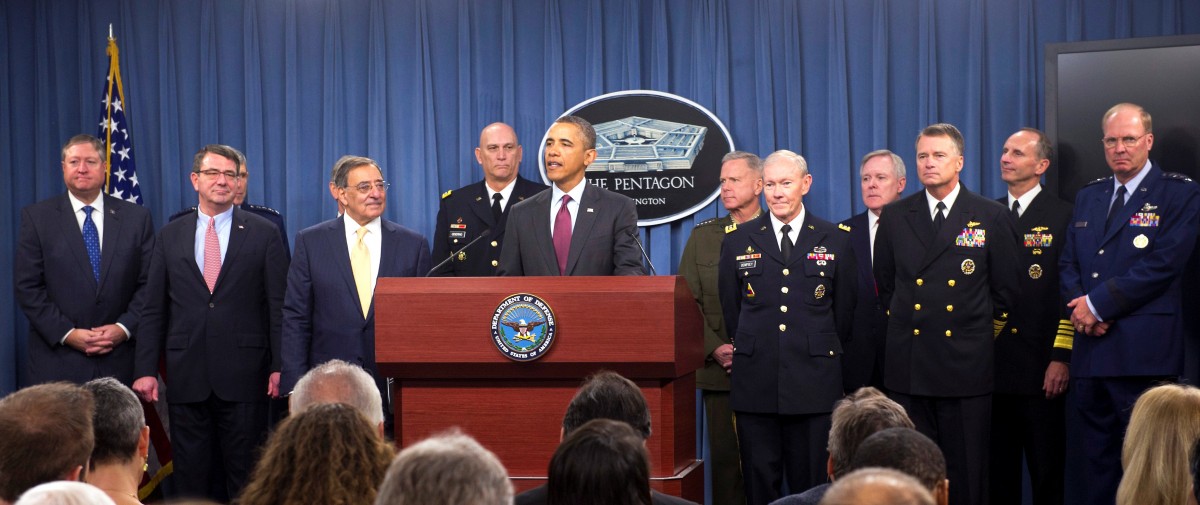
This is the second installment in a four-part investigative series about U.S. Defense-funded programs to spy on activists and Muslims worldwide. The series runs Monday through Thursday this week on Occupy.com. Read the first installment here.
The Pentagon’s multimillion dollar Minerva research program to fund social science research for military applications includes a flagship project established in 2009 at Arizona State University (ASU) to examine “radical” and “counter-radical” Muslim movements in Southeast Asia, West Africa and Western Europe.
The project’s "expert wisdom gathering tool," used by academics involved in the project to assess and rank the threat-level from organizations and civil society groups, set its sights on the UK, Germany, France, Europe generally, Nigeria, Niger, Senegal, Indonesia, Malaysia, Singapore and the Philippines.
Although purportedly designed to assess Islamic movements, among the 36 UK organizations targeted for ranking on the tool’s "radicalization" scale are several non-Muslim activist groups critical of US, British and Israeli foreign policy. A deeper analysis of the criteria used by the project to label organizations discloses serious deficiencies that tend to cast suspicion of propensity for violence on any group calling for radical social, political or religious change.
Conflating violent and nonviolent "radicalism"
Explaining the rationale behind the Minerva initiative, program director Dr. Erin Fitzgerald said, “Decreasing terrorism and political violence requires an understanding of the underlying forces that shape motivations and mobilize action. The vast majority of political movements – even only those with seemingly ‘radical’ political philosophies – do not turn violent or destabilize regional security; we want to understand what makes those leading to armed conflict different.”
This is why, she emphasised, the Pentagon is intent on studying both violent and nonviolent groups. “It is not enough to study only violent groups: just as diagnosing a disease requires a basic understanding of anatomy and physiology, understanding violent insurgencies requires a fundamental understanding of how mass movements develop broadly.”
Yet the research design of the ASU’s project examining radicalization discourses is deeply flawed, due to imprecise and incoherent definitions of political radicalism, violence and nonviolence. By having academic specialists grade the levels of radicalism of these organizations, the project attempted to fine-tune its algorithms to develop software that would automatically classify the organizations on a threat-scale with the same precision as those specialists.
“The QUIC based algorithm not only outperforms the baseline method, but it is also the only system that consistently performs at area expert-level accuracies for all scales,” the 2013 paper found.
Prof. Sajjad Rizvi of the University of Exeter’s Institute for Arab and Islamic Studies was one of the independent academics asked to rank the UK organizations. He said that he was not informed of the project’s relationship to the U.S. government or military, and thought the research design was poor.
“A colleague asked me to do it," said Rizvi, "but my understanding was that it was to develop a tool for social science research. I had no idea about government links. I thought the questions and concepts did not make sense and I wasn’t at all convinced about the overall method.”
The project’s scaling system is extraordinarily imprecise – especially on the most critical definitions of political radicalism and violence. The paper begins by acknowledging difficulties in distinguishing “violent forms of political Islam and others deemed to be potentially violent,” and argues that presumed distinctions between “radical/moderate,” “modern/traditional,” and “conservative/progressive” are in fact very blurred.
According to the paper, the research aims “to understand features shared by violent religious movements and by those opposing them,” arguing that “binary labeling does not capture the overlaps, movement and interactivity among” these “radical” and “moderate” actors. Political radicalism is simplistically defined as “the ideological conviction that it is acceptable and sometimes obligatory to use violence to effect profound political, cultural and religious transformations and to change the existing social order fundamentally.”
Groups engaged in activism for social change are susceptible to being ranked higher on the radicalism threat-scale. The “change orientation” scale measures “the degree to which an entity wishes to effect social, political, and/or religious change” and “to which an individual or group attempts to influence others.”
The project’s definition of violence is also exceedingly broad, encompassing “more than killing, inflicting physical injury, and destruction of property” – that is, “symbolic and discursive violence” as they are “often steps leading toward physical violence.” The assumption is that the “manipulation of symbols and discourse is purposively articulated” by extremists “to provoke adversaries, demonize opponents, incite mobs to action, or to provide justifications for the necessity of violence.”
But this manipulation of discourse is not obvious: “Unlike physical violence that can be seen and clearly understood for what it is, symbolic and discursive violence are not necessarily self-evident.”
The "violence ideology" scale thus seeks to measure whether groups support or reject violence, but by definition qualifies that “some of the movements scaled rely on reasoned argumentation appealing to concepts of justice and oppression in addition to, or in place of narratives [justifying violence].” This therefore could include antiwar or civil liberties groups that recognize the legitimate right of occupied peoples to resist, or call for large-scale nonviolent civil disobedience.
While “pacifists who are ideologically committed to nonviolence” are at the bottom of the threat-scale, such organizations would likely end up higher up on the scale even with no history of supporting violence: “A lack of violent rhetoric is insufficient to classify an organization as pacifist if the organization is silent in the face of others’ violent acts and violent rhetoric.”
The scaling system for social, political and religious change is equally if not more ambiguous, effectively drawing suspicion on any social movement campaigning for change: “Social change refers to changes in social roles or in the social order. This can be thought of as group or society level changes and public changes such as changing the role of women. Political change refers to efforts to change the law or political structure. Religious change refers to the desire or effort to change religious practices.”
Similarly, the scale to determine "violence engagement" is vague enough to classify a wide range of groups as potentially supportive of violence: “At the extreme left end of this scale are entities which vocally and adamantly reject violence/embrace non-violence, and for whom violence is never acceptable, even when violence is perpetrated against them.” Thus, simply not advocating violence is insufficient: “Passive rejection of violence includes some tacit acceptance of violence.”
Individuals and civil society groups that recognize the legitimacy of self-defense by communities under attack, including resistance against military intervention or occupation to defend the right of self-determination, and those which offer no specific condemnation of violence, could find themselves ranked higher up the "radicalism" scale. Consequently, the vast majority of social and civic organizations could be labeled, using the scaling system’s own definition, as “entities which view violence as acceptable or justified.”
Prof. Rizvi passed on his concerns about the poor methodology to his colleague, Prof. Jonathan Githens-Mazer who was a co-author of the Pentagon-backed study of UK groups, but this did not affect the design or conduct of the research.
I asked another senior supervisor of the project, computer scientist Prof. Hasan Davulcu, whether he was aware that the tools his team were creating could augment the U.S. intelligence community’s analytical capabilities to identify “radicals” in a way that might demonize peaceful political activists and, at worst, facilitate the targeting of terrorism suspects for extrajudicial assassinations.
“Our project aims to identify how Muslims resist and counter violent-extremists,” he said without explaining why non-Muslim and secular antiwar groups were included. The researchers hoped to make “a positive contribution that might one day help save lives of innocents.”
Prior to his ASU post, Prof. Davulcu was funded by the Pentagon’s Defense Logistics Agency for his work in industry.
The Pentagon’s implicit suspicion toward all political dissent is evident in another Minerva-funded research project led by Prof. Maria Rasmussen of the U.S. Naval Postgraduate School, which I previously reported on for the Guardian. Rasmussen’s research summary explicitly conflates non-violent peaceful activists and NGOs as “supporters of political violence” who are different from terrorists solely by not embarking on “armed militancy” themselves. As they are defined as being “sympathetic to radical causes” and “sympathetic to the end goals of armed groups,” non-violent activists are thus placed squarely on the spectrum of violent extremism.
“Asking universities to mine social media data to identify radicals on behalf of the military is the worst of all possible combinations,” said Robert Steele, former veteran CIA official and founding deputy director of the U.S. Marine Corps Intelligence Activity. A leading proponent ofopen source intelligence (OSINT), Steele is scathing about what he argues is an abuse of OSINT and how it should be undertaken.
“This program integrates academics dazzled by military funding who don’t understand culture, history, or foreign languages, with questionable technologies that are used by a tiny but powerful fraction of humanity with criminal ineptitude on the part of the government," Steele said.
Domestic extremists
In the same year that Prof. Githens-Mazer contributed to the ASU’s Pentagon-backed study of UK organizations to assess their support or opposition to “radicalism,” he delivered a September presentation with an active senior UK military official, Brigader Richard Stanford, chief of Joint Fires and Influence Branch (JFIB) at NATO’s Allied Rapid Reaction Corps (ARRC), at the Defence Information Superiority Conference hosted by Whitehall think tank the Royal United Services Institute (RUSI).
The slide presentation advocates a “Big Data” approach to gain a “cyber and information” advantage over the enemy to attack “the opponent’s will and cohesion.” But “large amounts of data” need to be “interpreted correctly with contextual awareness and cultural understanding” to produce “insightful results quickly.”
Githens-Mazer and Brigadier Stanford thus recommend the need for “SOCMINT” – social media intelligence – to “complement both SIGINT [signals intelligence] and HUMINT [human intelligence].” Social media must also be used to “communicate our message” and influence “perception and public opinion,” in addition to “horizon scanning” to preempt disorder, crime or conflict by drawing on the input of “regional and thematic experts” in analysing Big Data – particularly across complex open-ended areas like “public health,” “climate change,” and “urban environments.”
This approach is precisely what was being pursued by the DoD’s Minerva initiative to which Prof. Githens-Mazer contributed. He could not be reached for comment.
Just three months earlier, Githens-Mazer’s co-presenter Brigadier Stanford was directing NATO exercises in Corsica, an island south of France, to prepare for “any possible future conflict,” according to a local newspaper, the Gloucestershire Echo. Elite troops from 16 European countries, 60 per cent from the UK including the county of Gloucestershire, participated in the military exercises “which were set in the fictional country of Tytan, which has been facing strikes and increasing social unrest. Soldiers had to work from the nearby Corsica peninsula, after a lockdown by the Tytan government.”
“Corsica has given us a good awareness of potential challenges we could find on a real, operational deployment,” said exercise participant Lieutenant Colonel Dag Bjornerud, highlighting that NATO's planning for future warfare increasingly sees domestic civil unrest in the west as a primary threat. NATO’s enemy, in other words, includes discontented European populations calling for social change, and engaged in widespread social protest.
That month, Wired reported how since the 2011 London riots, the Metropolitan Police’s National Domestic Extremism Unit (NDEU) were applying SOCMINT methods, collecting public “tweets, YouTube videos, Facebook profiles, and anything else UK citizens post in the public online sphere,” which would then be subjected to the same sort of analytical tools being developed with Pentagon-funding at ASU. Some9,000 Britons, many from political groups, are being tracked as “domestic extremists” by the NDEU.
Dr. Nafeez Ahmed is a bestselling author, international security scholar, investigative journalist and regular Guardian contributor on the geopolitics of interconnected environmental, energy and economic crises. This is the second in a four-part investigation to be published on Occupy.com throughout this week. The first part can be read here.
3 WAYS TO SHOW YOUR SUPPORT
- Log in to post comments



















